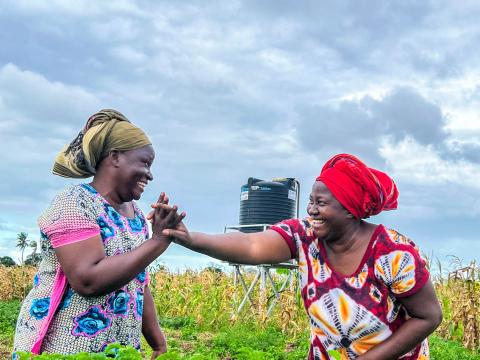Transformative project turns women from dependants to business owners in Kenya

By Martin Muluka, Emergency Communication Specialist, World Vision Kenya
It is a busy season for Zawadi and members of the Tupendane Farmers Group in Marafa, which is situated in Kilifi County, Kenya. She is busy harvesting, shelling and packing maize for the market. It is a season of plentiful harvest for the group, which comprises of twenty members.
The abundant harvest is as a result of adopting climate smart farming methods. Through its Kenya Integrated Emergency Response Project (KIERP), which is funded by the USAID's Bureau for Humanitarian Assistance, World Vision provided selected farmers in Kilifi with drip irrigation kits and trained them on good agronomic practices.
For many years, most families in the area used to rely solely on rain fed agriculture for food and income. This farming method is no longer reliable due to climate change which has led to long periods of drought and insufficient rainfall in the area.
Under its Livelihoods and Resilience programme, World Vision trained over 500 farmers from 25 groups in Marafa on climate-smart agricultural techniques, good agronomic practices, pre-and post-harvest management, as well as the importance of financial savings in agricultural production. This has changed the lives of many families.
“World Vision taught us about saving our finances, value addition and marketing of our farm produce. Last year, we harvested a lot of tomatoes which was sufficient for our home use, as well as for selling to make profit," says Zawadi, the Chairlady of the Tupendane Farmers Group.
She adds, “During farmer training sessions, we usually make food and snacks using produce from our farm and everyone likes them. This gave us the idea of starting a restaurant or catering business so as to offer our customers fresh food and diversify our income streams. We began the venture using our savings. The feedback from customers has been positive as they have spoken highly of our services and food.”

Purity, another member of the Tupendane Farmers Group notes that the restaurant has changed her life for good. She oversees its daily operation and has expanded its clientele base. Indeed, the restaurant now offers catering services to World Vision among other organisations in Kenya.
“I have achieved what I didn’t believe was possible in my life. World Vision has turned my dream into reality. Life before was difficult. I used to rely on rain for farming and I would watch with pain as the crops dried due to insufficient rainfall. I later joined this group and started farming under drip irrigation. Little did I know, when I started, that I would be running a successful business within no time. From this business, my family lives comfortably. I have constructed a new house and my family has more than enough to eat," she says.

According to Purity, the success of the restaurant gave them the confidence to competitively bid for catering services job opportunities in various organisations that needed them.
"One of our biggest clients is World Vision Kenya. We provide catering services whenever the organisation has events and training workshops here in Marafa. My heart is filled with joy and gratitude because not so long ago, I used to receive aid from World Vision. But now, I am a service provider for the organisation. I also donate food to the less fortunate in my community,” she says.
Dennis Mramba, the World Vision Project Manager in Kilifi notes that the organisation is keen on working with community-based organisations as well as groups in the implementation of its livelihoods projects.
“Our goal is to empower communities and enable families to become self-reliant, so they can take good care of their children and lead fulfilling lives. This is an area prone to drought. However, our training on climate-smart agricultural tips is helping families to boost their agricultural productivity, get income and diversify their livelihoods through the establishment of alternative businesses like the restaurant and catering business set up by the women," he says.
Zawadi, the chair of the Tupendane Farmers Group notes that their members have collectively harvested 80 sacks of maize from their farms.
"We are getting huge profits from selling the maize directly or using it to prepare meals that customers buy in our restaurant. We signed a three-year contract with World Vision, which gives us an assured market for our produce like cucumbers, tomatoes, maize and vegetables. With the income that we have received, we have bought farm machinery like a maize shelling machine to make our work easier," she says.
"Life is much better for each individual member of the group. We share the profit that we get from the farm and restaurant business equally. We are happy because we enjoy diversified income sources and get enough money to provide sufficient food and quality education for our children," adds Zawadi.